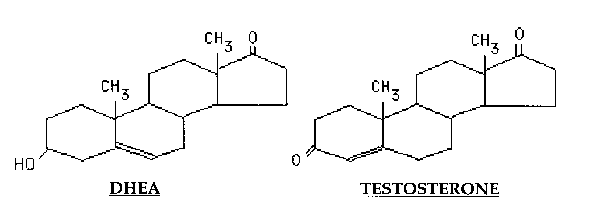Introduction
Dehydropeiandrosterone, or DHEA, is being touted as an anti-aging hormone, effective in preventing and reversing many of the debilitating changes in emotional and physical well-being we associate with aging and chronic disease. Most Americans are aware of the contributions of medicine in managing acute emergencies, but also their inability to offer treatment to the vast majority of people whose lives are limited by chronic disease.
What is interesting about DHEA is that the data collected thus far shows that low levels correlate with many aspects of the decline with aging - from vigorous good health into what we think of as old age. What is even more interesting is that low-dose, physiologic supplementation of DHEA appears to enhance one's health and sense of well-being. Used as a medicine in higher doses, it appears to ameliorate many serious disease processes.
The Chemistry of DHEA
Until recently, scientists believed that DHEA only formed the pool from which other active hormones could be synthesized. It is clear that the chemical structure of DHEA is similar to that of testosterone. Both are derivatives of the cholesterol molecule. With the difference of one carbon-chain section of the molecule, cholesterol is strikingly similar to both DHEA and testosterone. Since it is similar to other steroid hormones (estrogen, progesterone, testosterone), it can convert of stimulate production of estrogens, testosterone, or cortisone, and many other steroid hormones when the body needs them.


Recent research indicates that, although DHEA is similar to other androgens, there are specific receptors on the cell surface that indicate a likelihood of individual function.
Potential Health Benefits of DHEA
The most important aspect of DHEA and health is that it has a barrage of claims for improving health in general, and reducing the effects of many chronic diseases. This may be the most powerful attribute to this over-the-counter hormone. To date, the following research has been performed with DHEA:
1. HEART DISEASE - Men with heart disease have lower naturally occuring levels of DHEA-sulphate than healthy men. They are three times more likely to die of heart disease. DHEA also lowers serum LDL cholesterol. The use of ingested DHEA may raise internal levels of the hormone and reduce the risk of aquiring heart disease. Research by Barret-Conner and colleagues confirms the risk reduction with the use of DHEA. It will be interesting to see if it is more-often prescribed (or taken supplimentally) in persons with one or more heart disease risk factors.
2. OBESITY - Obese mice do not become diseased if their diets are supplemented with DHEA. More research needs to be performed in persons with moderate and morbid (over 350 lbs.) obesity to see the benefits of taking DHEA would have, such as the reduction of peripheral vascular disease, diabetes, or hypertension.
3. CANCER - Mice bred for cancer do not develop cancer when their diets are supplemented. Also - there is an association with low levels of DHEA and breast cancer. If this concept can be applied to people, it would be one of the most significant attributes of taking DHEA. Mice bred for cancer have a much higer incidence rate for development of tumors than their non-experimental counterparts. If DHEA does completely reverse neoplastic development, it must be looked upon favorably. Remember that naturally occuring DHEA levels decrease with age, and all forms of cancer increase, so the relationship between low levels and tumor development is a sound one. We must also remember that much of the research in cardiovascular health in animals may not be directly applicable to humans. This research must be studied in humans with a strong family history of cancer development (in a primary prevention trial), or those who have had tumors removed, and followed for over a 5 year period to see what the remission status will be. None the less, it is a promising area of health improvement possibility.